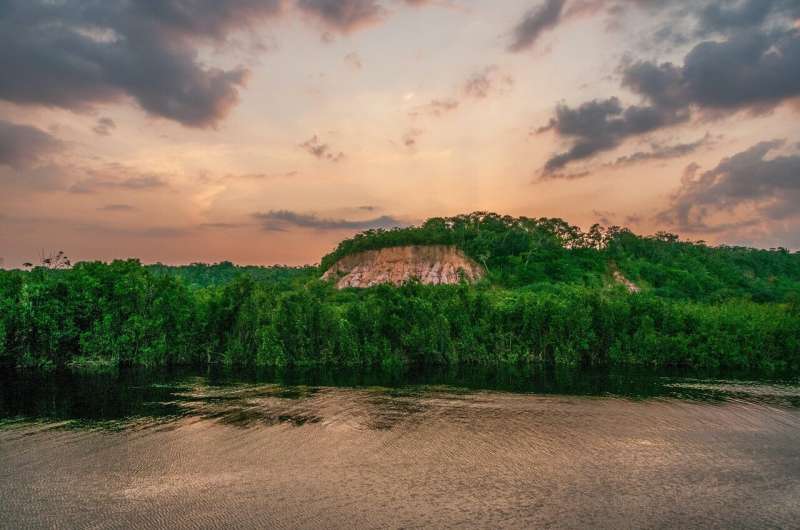Amazon rainforest fire season starts with outlook for record burn

A month from now, the skies over parts of Brazil will fill with smoke. It's fire season in the Amazon, and the planet's largest rain forest is heading for another record burn.
Every year, illegal loggers use bulldozers and chainsaws to rip through huge swaths of jungle, land that's then set on fire to make way for crops or cattle. This year, they've been particularly busy. A report released Monday shows an area 11 times the size of New York City could be incinerated.
Unlike last year, when images of 300-year-old trees ablaze fueled international outrage, little stands in the way now. The world's focus is squarely on combating COVID-19 and its fallout. Brazilian teams of officers charged with patrolling the biome have been sickened or sidelined. And the federal government, led by a president who has jokingly referred to himself as "Captain Chainsaw," has been quick to seize on the pandemic as cover for further easing already lax environmental rules and enforcement.
"Deforestation is almost entirely a reflection of public policy signals from Bolsonaro's government," said Tasso Azevedo, general coordinator at MapBiomas, a land-use monitoring platform. "And what he's signaling is that illegal actors won't be punished."
As many as 4,500 square kilometers (1,740 square miles) have already been leveled and prepped for burns starting July, when the region's dry season starts and blazes begin, according to Monday's report from the Amazon Environmental Research Institute, known as Ipam, in collaboration with University of Sao Paulo researchers and the Massachusetts-based Woods Hole Research Center.
The territory—which loggers were forced to abandon last year when threats of derailed trade deals strong-armed a reluctant Jair Bolsonaro into boosting enforcement—may double to some 9,000 square kilometers as tree felling continues, said Ipam, citing data from Brazil's national space institute. New York City's five boroughs occupy about 790 square kilometers.
The Amazon, which spans nine countries and is larger than the Western U.S., hosts a wealth of biodiversity and helps regulate rains throughout the continent. The forest has lost its superpowers as cleaner of the world's air, as fires spew pollution faster than its plants and trees can absorb it.
With COVID-19 racing through Brazil's impoverished north, it's hampering the ability of environmental agencies to fight back, which in turn makes the locals more vulnerable to getting sick as smoke fills the air. In Para state, one Amazon inspector died after catching the bug and almost half a 10-member enforcement team fell ill, as did the state's Environment Secretary Jose Mauro O' de Almeida.
"The government hired more enforcement agents and we were training them when the pandemic hit," Almeida said in a telephone interview after recovering. "We were forced to stop everything."
Death rates in the north average 31 per 100,000 inhabitants, more than twice the national average, according to Health Ministry statistics. Brazil as a whole has more cases than anywhere else outside the U.S. Depending on weather conditions, the smoke from Amazon fires can spread far and wide, according to Azevedo.
Azevedo said fires are also expected across the vast savanna known as the Cerrado in central Brazil. And blazes have surged from a year ago in the Pantanal, the world's largest tropical wetland, which borders Bolivia and Paraguay, according to Brazil's National Institute for Space Research, known as Inpe.
MapBiomas estimates deforestation has accelerated to the fastest pace in 13 years. Meanwhile, the federal government has retrenched after last year's outcry forced Bolsonaro's hand in bolstering enforcement with national troops. Authorization for the army to be there expires on Wednesday and so far there's been no extension.
Bolsonaro has argued that the Amazon belongs to Brazil and its natural resources should be used to develop the northern region and reduce poverty, claiming that foreign interest stems from a desire to control its mineral wealth rather than preserve its ecosystem.
In a closed-door meeting, Environment Minister Ricardo Salles urged Bolsonaro to take advantage of global leaders' COVID-19 blinders to simplify regulations, according to a video of the gathering released by the Supreme Court on May 22.
"We need to make the effort here while it's calm in terms of press coverage, because they're only talking about COVID," Salles said in the recorded meeting, suggesting they "change all the rules."
With a month to go before the dry season starts in full force, Amazonas state Environment Secretary Eduardo Taveira said in a telephone interview he's worried fires will eclipse last year's pace. And once the blazes start, MapBiomas's Azevedo said, they're nearly impossible to stop.
"It sounds beautiful—the images of helicopters combating fires," Azevedo said. "But in the end, it doesn't work."
©2020 Bloomberg News
Distributed by Tribune Content Agency, LLC.




















